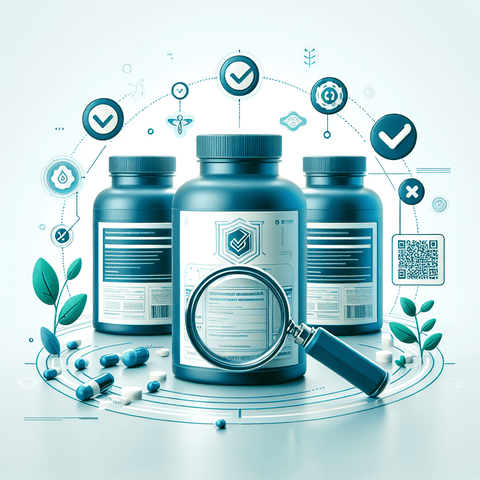Introduction
The landscape of personal health and wellness has seen a remarkable transformation over recent decades. Today, an increasing number of individuals turn to dietary supplements as part of their daily routine — driven by a desire to optimize health, fill nutritional gaps, and support specific wellness objectives. Dietary supplements encompass a broad range of products, from vitamins and minerals to herbal formulations, amino acids, and specialized nutraceuticals. Their popularity is fueled not only by a rise in health awareness but also by the proliferation of information and product options available online and in retail stores.
However, with this plethora of choices comes a critical need: how does one discern which supplements will truly support their health goals? Not all supplements are created equal, and choosing the wrong products can lead to inefficacy or even potential health risks. The key lies in understanding what makes a supplement effective, how to tailor choices to individual needs, and ensuring safety and quality in every purchase.
In this comprehensive guide, we will explore the foundational aspects of dietary supplements, the science behind efficacy, personalized nutrition strategies, quality assurance measures, natural health boosters, and tips to maximize nutrient absorption. Whether you’re new to supplements or seeking to refine your wellness regimen, this article aims to equip you with practical, evidence-based insights to unlock the hidden benefits of effective supplementation. Let’s embark on this journey toward smarter, safer, and more personalized health optimization.
1. Understanding Nutritional Supplements: The Foundation of a Healthy Lifestyle
Nutritional supplements are products designed to augment a balanced diet by providing essential nutrients that may be missing or insufficient. They serve as supportive tools to enhance overall wellness, bolster immune function, improve energy levels, and address specific health concerns. Before diving into selection criteria, it’s important to understand what these products are, their types, and their fundamental roles.
**Definition and Types of Dietary Supplements**
Dietary supplements encompass a wide variety of products formulated to supplement the diet. They are typically available in forms such as capsules, tablets, powders, liquids, and even gummies. The primary goal is to deliver concentrated nutrients that can be consumed conveniently.
**Common Categories**
*Vitamins and Minerals:* These are essential micronutrients needed for a variety of biological functions. Vitamins like Vitamin C support immune health, Vitamin D is crucial for calcium absorption, Vitamin K plays a role in blood clotting and bone health, and minerals like magnesium contribute to energy production and muscle support. Many consumers turn to supplement categories such as Vitamin C and Vitamin D for immune and bone health, as well as magnesium for energy and recovery.
*Herbal Supplements and Botanicals:* These are derived from plants and used for their traditional or scientifically supported health benefits. Popular examples include ginseng for energy and focus, echinacea for immune support, and turmeric for anti-inflammatory properties.
*Amino Acids and Proteins:* Essential amino acids are the building blocks of proteins, supporting muscle synthesis and recovery. Branched-chain amino acids (BCAAs) are often used by athletes to optimize performance.
*Specialized Formulas:* These encompass targeted products formulated for specific health concerns such as joint health, cardiovascular wellness, or cognitive support. They often combine multiple ingredients for comprehensive benefits.
**Filling Nutritional Gaps and Supporting Wellness**
Supplements can help correct deficiencies due to diet, lifestyle, or health conditions. For example, vegetarians may seek Vitamin B12 supplements, while older adults might focus on calcium and Vitamin D. They complement healthy eating habits to foster optimal functioning.
**Food-Based Nutrients vs. Concentrated Forms**
While naturally occurring nutrients in food are ideal, concentrated supplement forms can deliver higher doses of specific nutrients efficiently. For example, a high-quality fish oil supplement provides concentrated omega-3 fatty acids, directly supporting cardiovascular and brain health.
**Supporting a Balanced Diet**
Supplements are not replacements for nutritious foods but should be viewed as supportive additions. A well-rounded diet rich in fruits, vegetables, whole grains, lean proteins, and healthy fats remains fundamental. Supplements help bridge nutritional gaps, especially in cases of dietary restrictions, increased needs, or limited food intake.
2. Supplement Efficacy: Selecting Products That Deliver Real Results
Efficacy refers to a supplement’s ability to produce the desired health outcome based on its ingredients and formulation. Choosing efficacious products ensures that your wellness investments are meaningful and aligned with your health goals.
**Scientific Evidence and Clinical Support**
Reliable supplements are backed by scientific research attesting to their safety and effectiveness. Always review the scientific literature and product claims critically. Trusted brands often cite peer-reviewed studies supporting their formulations.
**Evaluating Ingredients and Formulations**
Countless supplements contain a blend of active compounds, but not all are equally bioavailable or potent. Look for products with clinically supported ingredient dosages, high absorption rates, and proven formulations. For example, if aiming to boost immunity, choosing a vitamin C supplement with bioavailable forms and adequate dosing enhances expected benefits.
**Common Misconceptions**
It’s a widespread myth that “more is better” with supplements. Excessive doses can cause side effects and toxicity. Effective supplementation involves optimal dosing, tailored to individual needs, rather than simply maximizing intake.
**Staying Informed About New Research and Developments**
The supplement landscape is continually evolving with new research and innovative formulations. Regularly consult reputable sources, scientific journals, and trusted brands to stay updated on emerging evidence.
**Testing and Measuring Impact**
Assess the effectiveness of your supplements by tracking symptoms, lab results, or wellness markers over time. For instance, monitoring vitamin D levels through blood tests can guide adjustments in dosage and formulation, ensuring you meet your specific health targets.
3. Personalized Nutrition: Tailoring Supplements to Your Unique Needs
The concept of personalized nutrition recognizes that each individual’s nutritional requirements are unique, influenced by genetics, age, gender, lifestyle, and health status. Tailoring your supplement regimen maximizes benefits while minimizing unnecessary intake or adverse interactions.
**Factors Influencing Supplement Needs**
Age impacts nutrient requirements; children, adults, and seniors all have different needs. Gender influences supplement choices; women may focus on iron or calcium, men on different mineral balances. Genetic factors also influence how nutrients are metabolized. Lifestyle factors such as physical activity, stress levels, and sleep patterns play crucial roles in determining specific supplement needs.
**Identifying Deficiencies**
Blood tests, nutritional assessments, and symptom tracking can help identify deficiencies. For instance, fatigue and muscle weakness might indicate magnesium deficiency, while low bone density warrants calcium and vitamin D optimization.
**Consulting Healthcare Professionals**
Professionals such as dietitians and physicians can interpret test results and recommend personalized supplement plans, avoiding unnecessary or duplicated nutrient intake.
**Testing Kits and Assessments**
Home testing kits for vitamin and mineral levels are increasingly available. They provide a convenient way to gauge your nutritional status and tailor your supplement choices accordingly.
**Advantages of Customized Approaches**
Personalized plans improve efficacy, reduce waste, and enhance safety. They can address specific health concerns more effectively than generic recommendations, supporting long-term adherence and better outcomes.
4. Supplement Quality Assurance: Ensuring Safety and Purity
Quality assurance is vital for safe, effective supplementation. Contaminants, adulterants, and counterfeit products pose serious health risks and undermine trust. Educating yourself on quality standards safeguards your health.
**Regulatory Standards and Certifications**
Look for products certified by reputable third-party organizations such as GMP (Good Manufacturing Practices), NSF International, and USP (United States Pharmacopeia). These certifications verify manufacturing quality, potency, purity, and labeling accuracy.
**Common Contaminants and Adulterants**
Contamination with heavy metals, microbial agents, or unlisted substances can occur, especially in lower-quality products. Always check for third-party testing results to confirm safety.
**Identifying Counterfeit or Substandard Supplements**
Counterfeit products may lack active ingredients or contain harmful substances. Purchase from reputable sources or directly from trusted brands’ official websites.
**Verifying Authenticity and Brand Transparency**
Research the manufacturer’s reputation, review certifications, and read customer feedback. Transparent brands disclose ingredient sources, testing reports, and manufacturing practices.
5. Natural Health Boosters: Embracing Nature’s Remedies for Wellness
Natural ingredients in supplements are valued for their holistic approach to health, often offering fewer side effects and supporting multiple bodily systems simultaneously.
**Overview of Natural Ingredients**
Herbs, botanicals, and superfoods such as turmeric, echinacea, ginseng, spirulina, and maca are common natural health boosters. They are used to support immunity, energy, cognitive function, and inflammation management.
**Benefits of Natural Supplements**
Natural products tend to be gentle on the body, often providing synergistic effects due to multiple active compounds. They are suitable for long-term use when sourced responsibly.
**Popular Natural Supplements**
- Immune Support: Echinacea, elderberry, garlic
- Energy and Vitality: Ginseng, adaptogens like Rhodiola
- Brain Health: Ginkgo biloba, omega-3 fatty acids
- Anti-inflammatory and Joint Support: Turmeric, boswellia
Explore options like Omega-3 EPA & DHA supplements for brain and heart health.
**Incorporating Natural Supplements**
Integrate these with a balanced diet and lifestyle for holistic wellness. For example, combining herbal teas with supplement regimens can enhance their effects.
**Cautions and Safety Considerations**
Some herbs may interact with medications or have contraindications. Always consult a healthcare provider before adding new natural supplements, especially if pregnant, nursing, or on medication.
**Sourcing and Sustainability**
Choose products made from sustainably harvested ingredients with transparent sourcing practices to ensure quality and environmental responsibility.
6. Optimal Nutrient Absorption: Maximizing the Benefits of Your Supplements
Absorption determines how effectively your body utilises the nutrients from supplements. Even the most potent formula is ineffective if nutrients are poorly absorbed or metabolized improperly.
**Why Absorption Matters**
Bioavailability refers to the fraction of a nutrient that enters circulation and reaches the site of action. Improving absorption enhances efficacy and helps avoid unnecessary excess intake.
**Factors Influencing Absorption**
- **Formulation:** Some ingredient forms, like methylcobalamin for B12 or liposomal delivery for curcumin, are more bioavailable.
- **Timing and Food Interactions:** Taking supplements with meals containing healthy fats can enhance absorption, especially for fat-soluble vitamins like D and K.
- **Interactions:** Certain nutrients can compete for absorption; for example, calcium and iron should be taken separately.
**Tips to Enhance Absorption**
- Take fat-soluble vitamins with meals containing fats
- Pair vitamin D with magnesium for synergistic benefits
- Use liquid or sublingual forms for rapid absorption
- Avoid taking high-dose supplements simultaneously unless advised
**Barriers to Absorption**
Digestive health plays a pivotal role. Conditions like GERD, malabsorption syndromes, or dysbiosis can impair nutrient uptake, emphasizing the importance of supporting gut health through diet and probiotics.
**Innovative Delivery Methods**
Emerging supplement forms such as liposomes, microemulsions, and nanoparticles aim to improve bioavailability and absorption efficiency, providing targeted delivery to tissues.
Conclusion
Choosing the most effective dietary supplements requires a thorough understanding of their types, efficacy, personal relevance, quality, natural options, and absorption mechanisms. Informed decisions about supplementation help unlock hidden health benefits, support your wellness goals, and promote long-term vitality. Remember, always prioritize professional guidance, quality assurance, and sourcing reputable products. By integrating science-backed insights with personalized strategies, you can make your supplement regimen a powerful tool in your overall health journey.
For tailored supplement recommendations and to explore our top-rated product ranges, visit topvitamine.com.
Q&A Section
1. How do I determine which supplements are right for my specific health goals?
Start by identifying your health objectives — whether immune support, energy enhancement, or bone health. Conduct assessments such as blood tests or consult healthcare professionals to determine potential deficiencies. Tailor your supplement choices based on personalized recommendations rather than generic ones. For example, choosing a high-quality Vitamin D supplement if levels are low can be more effective than broad-spectrum multivitamins.
2. How can I ensure the supplements I purchase are safe and of high quality?
Look for certifications from reputable organizations like GMP, NSF, or USP. Review third-party testing reports, research the manufacturer’s reputation, and buy from trusted sources. Avoid products with suspicious claims or unverified ingredients. Prioritize brands that disclose sourcing and manufacturing details to ensure safety.
3. What are some natural supplement options I might consider for supporting my wellness?
Herbal remedies such as echinacea, ginseng, turmeric, and omega-3 fatty acids are popular natural options. They are known for their holistic benefits and are generally well-tolerated when sourced responsibly. Supplements like omega-3 (DHA/EPA) are particularly beneficial for brain and heart health. Always consult with a healthcare professional before introducing natural herbs into your routine.
4. How important is nutrient absorption, and what can I do to improve it?
Absorption significantly influences the effectiveness of supplements. To boost bioavailability, take fat-soluble vitamins with meals containing healthy fats, use advanced delivery systems when possible, and support gut health to improve overall absorption. Being mindful of nutrient interactions and timing doses separately can also help maximize benefits.
5. Should I rely solely on supplements for nutrition?
No, supplements should complement a balanced diet, not replace it. Whole foods provide a complex array of nutrients and fiber that supplements cannot fully replicate. Use them to fill nutritional gaps or support specific needs, in conjunction with a nutritious diet and healthy lifestyle.
Important Keywords
- Dietary Supplements
- Supplement Efficacy
- Personalized Nutrition
- Quality Assurance
- Natural Supplements
- Nutrient Absorption
- Supplement Safety
- Bioavailability
- Reputable Supplement Brands
- Health and Wellness Goals



